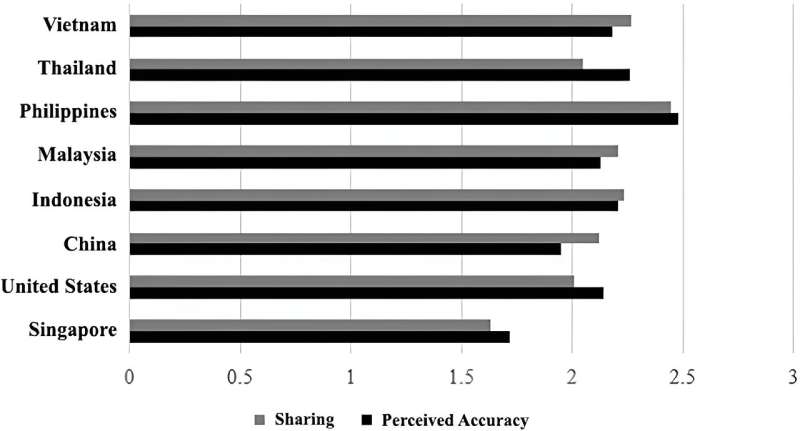This article has been reviewed according to Science X's editorial process and policies. Editors have highlighted the following attributes while ensuring the content's credibility:
fact-checked
peer-reviewed publication
trusted source
proofread
Social media fatigue and narcissism linked to believing and sharing misinformation, finds 8-country study

A study by Nanyang Technological University, Singapore (NTU Singapore) found that those who say they are tired or overwhelmed by social media are likelier to believe in misinformation and share it online.
Using COVID-19 fake news as an example of misinformation, the NTU Singapore study also found that narcissistic individuals experiencing social media fatigue are more likely to share misinformation.
The study is based on more than 8,000 survey responses from participants in Singapore, the United States, Malaysia, China, Thailand, Vietnam, Indonesia and the Philippines.
With millions of users relying on social media as a source of news and entertainment and as a mode of communication, addressing social media fatigue and its consequences is imperative, said the researchers.
While many societies underscore the importance of reduced social media usage for improved physical and mental health, relatively little attention has been paid to the detrimental impact of social media usage on the information ecosystem.
NTU Wee Kim Wee School of Communication and Information's Assistant Professor Saifuddin Ahmed, who led the study, said, "Social media fatigue creates an information overload that hampers the cognitive judgment of social media users. In such circumstances, individuals become overwhelmed and struggle to critically evaluate the misinformation they encounter, whether it pertains to COVID-19 or other topics.
"Another explanation for this effect of social media fatigue is how social media algorithms function—prioritizing controversial, sensational, and emotionally charged content. Being exposed repeatedly to such content may cause individuals to perceive it as accurate.
"Through our study, we have shown that individuals can unintentionally contribute to disseminating misinformation due to their cognitive ability and 'dark' personality traits such as narcissism. Such insights could be leveraged to shape preventive measures, emphasizing the importance of social media literacy and initiatives to mitigate social media fatigue."
The study, published in the journal Scientific Reports, was done in collaboration with Muhammad Ehab Rasul, a Ph.D. student at the University of California, Davis.
How the study was conducted
The survey participants were first assessed for their social media fatigue by rating their level of agreement to five statements concerning their social media use, such as whether they feel mentally exhausted or too tired to perform other tasks due to social media use.
Participants were then asked to rate the accuracy of a series of false claims about COVID-19, presented in a mock social media post style, and their likelihood of sharing these claims. One such post read: "Coconut is effective in reducing COVID-19 symptoms." Another read: "COVID-19 vaccinations are dangerous and ineffective against omicron variants."
Participants were assessed for cognitive ability through a 10-item vocabulary test that is strongly associated with general measures of intelligence and is used frequently in scientific research as a proxy to examine intelligence. They were also evaluated for behavioral traits that suggest narcissism through a personality inventory test.
Cognitive skills determine an individual's ability to analyze information critically. Narcissism is characterized by an increased desire for attention, admiration, and feelings of uniqueness, which may increase an individual's propensity to share misinformation.
Role of social media fatigue, cognitive ability, and narcissism
Through statistical analyses, the researchers found that survey participants from all eight countries who experience social media fatigue are more likely to fall for misinformation. However, the results for sharing misinformation are more nuanced.
In Singapore, whether an individual with social media fatigue shares misinformation depends on whether they think the misinformation is accurate. In the remaining seven countries, those who experience higher levels of social media fatigue can share misinformation regardless of accuracy.
The researchers then investigated how cognitive and narcissistic traits affected this relationship.
They found that individuals with higher narcissistic tendencies are more likely to perceive the misinformation as accurate and share it on social media when fatigued.
Across all eight countries, individuals scoring high on narcissism and low on cognitive ability were the most likely to share misinformation due to social media fatigue.
These findings highlight the need to focus on the importance of narcissism in misinformation sharing, said the researchers.
Asst Prof Saifuddin explained, "With high levels of fatigue, these individuals could be sharing misinformation as they may be trying to seek attention and gain social influence without applying critical thinking. This tendency to share misinformation is particularly relevant for misinformation that is often characterized by sensational and controversial content eliciting strong emotional reactions from the audience."
He added that excessive fatigue may also amplify impulsivity among low cognitive narcissists. "Narcissists prefer immediate rewards and satisfaction rather than delayed gratification. Thus, it is likely that when accompanied by high fatigue and limited cognitive ability, narcissists do not make sound judgements about misinformation and share them due to their impulsive nature."
Multi-pronged approach needed to combat misinformation
These findings suggest that policy makers and social media companies who aim to combat misinformation should adopt a multi-pronged approach that involves regulations to restrict the spread of misinformation and raise digital literacy, but also interventions aimed at reducing social media fatigue. This will not only directly address the issue of fatigue but may also limit misinformation propagation because of the fatigue, said the researchers.
The finding that individuals with particular personality and cognitive traits are more susceptible to misinformation propagation than others suggests the need for interventions tailored to specific groups rather than one-size-fits-all approaches, they added.
More information: Saifuddin Ahmed et al, Examining the association between social media fatigue, cognitive ability, narcissism and misinformation sharing: cross-national evidence from eight countries, Scientific Reports (2023). DOI: 10.1038/s41598-023-42614-z
Journal information: Scientific Reports
Provided by Nanyang Technological University




















